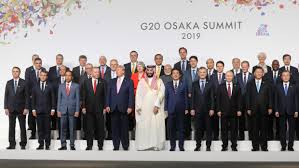A 165-strong international group including 92 former Presidents and Prime Ministers, along with current economic and health leaders in the developed and developing world have come together to demand the creation of a G20 executive task force.
They also want an immediate global pledging conference which would approve and co-ordinate a multi-billion dollar coronavirus fighting fund.
In an open letter addressed to G20 leaders the group - which wants both to speed up the search for a vaccine, cure and treatments and revive the global economy - urges global collaboration and commitment to funding ‘far beyond the current capacity of our existing international institutions’.
“The economic emergency will not be resolved until the health emergency is addressed: the health emergency will not end simply by conquering the disease in one country alone but by ensuring recovery from COVID-19 in all countries,” the statement says.
The plea is for agreement within days for:
- $8 billion to rapidly hasten the global effort for vaccines, cure and treatment;
- $35 billion to support health systems, from ventilators to test kits and protective equipment for health workers;
- And $150 billion for developing countries to fight the medical and economic crisis, prevent a second wave of the disease flowing back into countries as they come out of the first wave. This means waiving debt interest payments for the poorest countries, including $44billion due this year from Africa. A $500-$600billion issue of additional resources by the IMF in the form of special drawing rights is proposed.”
The letter also urges the co-ordination of fiscal stimuli to avoid a recession becoming a depression.
While welcoming the G20’s first communique on the Covid-19 crisis, the 165-strong group are pressing the G20 to speed up an action plan.
The group states: "All health systems – even the most sophisticated and best funded – are buckling under the pressures of the virus. Yet if we do nothing as the disease spreads in poorer African, Asian and Latin American cities which have little testing equipment, hardly any ventilators, and few medical supplies; and where social distancing and even washing hands are difficult to achieve, Covid-19 will persist there – and re-emerge to hit the rest of the world with further rounds that will prolong the crisis.
"World leaders must immediately agree to commit $8 billion – as set out by the Global Preparedness Monitoring Board – to fill the most urgent gaps in the COVID-19 response. This includes $1billion this year for WHO, $3 billion for vaccines and $2.25 billion for therapeutics.
"Instead of each country, or state or province within it, competing for a share of the existing capacity, with the risk of rapidly-increasing prices, we should also be vastly increasing capacity by supporting the WHO in coordinating the global production and procurement of medical supplies, such as testing kits, personal protection equipment, and ITU technology to meet fully the worldwide demand. We will also need to stockpile and distribute essential equipment.
“$35 billion will be required, as highlighted by WHO, to support countries with weaker health systems and especially vulnerable populations, including the provision of vital medical supplies, surge support to the national health workforce (70% of whom in many countries are underpaid women) and strengthening national resilience and preparedness.
“According to WHO, almost 30% of countries have no COVID-19 national preparedness response plans and only half have a national infection prevention and control program. Health systems in lower income countries will struggle to cope; even the most optimistic estimates from Imperial College London suggest there will be 900,000 deaths in Asia and 300,000 in Africa.
"We propose convening a global pledging conference – its purpose supported by a G20 Executive Task Force - to commit resources to meeting these emergency global health needs.”
On the Global Economic outlook, the group propose a range of measures and state:
"Much has been done by national governments to counter the downward slide of their economies. But a global economic problem requires a global economic response. Our aim should be to prevent a liquidity crisis turning into a solvency crisis, and a global recession becoming a global depression.
"To ensure this, better coordinated fiscal, monetary, central bank, and anti-protectionist initiatives are needed. The ambitious fiscal stimuli of some countries will be all-the-more effective if more strongly complemented by all countries in a position to do so.
“The long term solution is a radical rethink of global public health and a refashioning – together with proper resourcing – of the entwined global health and financial architecture.
“The UN, the G20 and interested partners should work together to co-ordinate further action.”
Latest Stories
-
Shamima Muslim urges youth to lead Ghana’s renewal at 18Plus4NDC anniversary
24 minutes -
Akufo-Addo condemns post-election violence, blames NDC
31 minutes -
DAMC, Free Food Company, to distribute 10,000 packs of food to street kids
2 hours -
Kwame Boafo Akuffo: Court ruling on re-collation flawed
2 hours -
Samuel Yaw Adusei: The strategist behind NDC’s electoral security in Ashanti region
2 hours -
I’m confident posterity will judge my performance well – Akufo-Addo
2 hours -
Syria’s minorities seek security as country charts new future
3 hours -
Prof. Nana Aba Appiah Amfo re-appointed as Vice-Chancellor of the University of Ghana
3 hours -
German police probe market attack security and warnings
3 hours -
Grief and anger in Magdeburg after Christmas market attack
3 hours -
Baltasar Coin becomes first Ghanaian meme coin to hit DEX Screener at $100K market cap
4 hours -
EC blames re-collation of disputed results on widespread lawlessness by party supporters
4 hours -
Top 20 Ghanaian songs released in 2024
5 hours -
Beating Messi’s Inter Miami to MLS Cup feels amazing – Joseph Paintsil
5 hours -
NDC administration will reverse all ‘last-minute’ gov’t employee promotions – Asiedu Nketiah
5 hours

